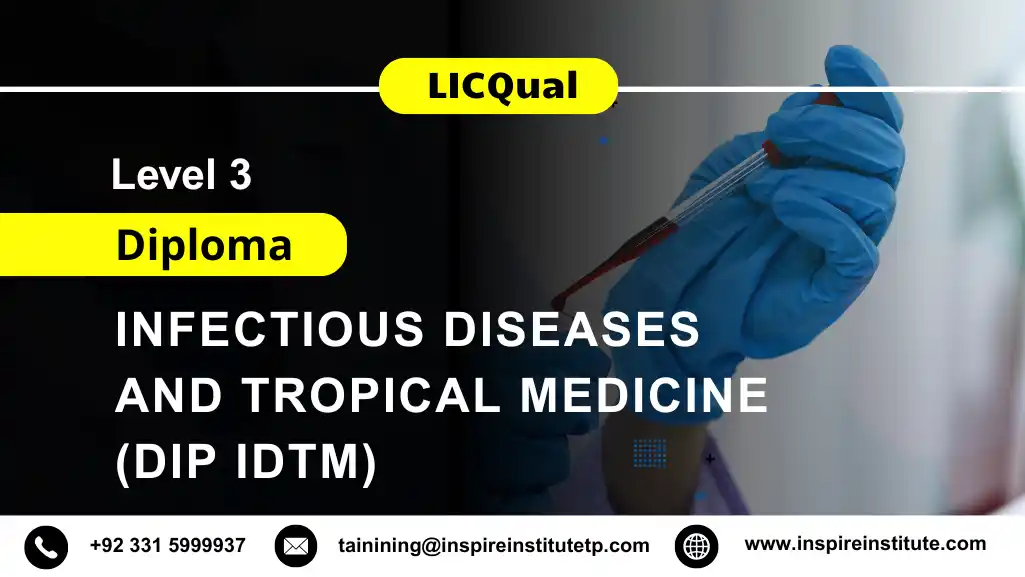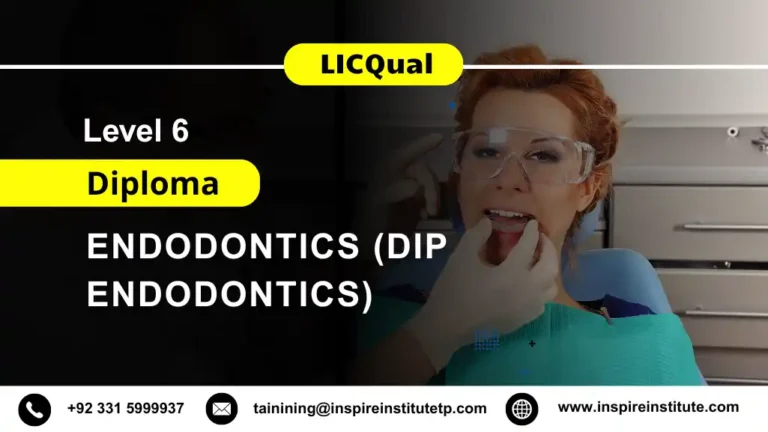LICQual Level 3 Diploma in Infectious Diseases and Tropical Medicine (Dip IDTM)
The LICQual Level 3 Diploma in Infectious Diseases and Tropical Medicine (Dip IDTM) is a UK-accredited qualification designed to equip healthcare professionals, medical assistants, and aspiring clinicians with the essential knowledge and competencies to manage, prevent, and control infectious diseases and tropical illnesses worldwide. In an era where global health threats are constantly evolving, this qualification provides learners with the expertise to understand disease transmission, implement infection prevention strategies, and contribute to global public health improvement.
This Infectious Diseases and Tropical Medicine course introduces learners to the study of bacteria, viruses, fungi, and parasites responsible for major infectious conditions affecting tropical and subtropical regions. It focuses on understanding the epidemiology, pathophysiology, and clinical presentation of diseases such as malaria, dengue fever, tuberculosis, HIV/AIDS, cholera, and emerging zoonotic infections. Learners will explore modern diagnostic techniques and the latest evidence-based treatment protocols used in infectious disease management and tropical medicine.
The LICQual Level 3 Diploma in Infectious Diseases and Tropical Medicine (Dip IDTM) emphasizes practical learning through case studies, applied research, and public health scenarios. Learners develop the ability to recognize, diagnose, and manage infectious and tropical diseases in both community and clinical settings. This ensures that graduates can apply theoretical knowledge effectively in hospitals, laboratories, public health departments, and international healthcare organizations.
Throughout this infectious disease management diploma, participants will gain vital skills in outbreak investigation, disease surveillance, antimicrobial resistance monitoring, and preventive healthcare. Training also covers travel medicine, immunization strategies, and infection control in global and resource-limited environments—making it ideal for professionals seeking to work in global health or humanitarian sectors.
As a flexible, assignment-based qualification, the LICQual Level 3 Diploma in Infectious Diseases and Tropical Medicine enables learners to balance their studies with ongoing professional or personal responsibilities. The programme is designed to be accessible to both experienced healthcare workers and individuals aspiring to specialize in infectious disease and tropical medicine, ensuring academic excellence and professional relevance.
By completing this internationally recognised UK diploma in Infectious Diseases and Tropical Medicine, learners gain the confidence and competence to make meaningful contributions to global health systems. Graduates are equipped to play vital roles in public health, epidemiology, tropical medicine research, and healthcare delivery, addressing the world’s most pressing infectious disease challenges with knowledge, skill, and ethical professionalism.
Why Choose this Qualification
The LICQual Level 3 Diploma in Infectious Diseases and Tropical Medicine (Dip IDTM) is a globally relevant qualification designed for healthcare professionals, medical assistants, and public health practitioners seeking to specialize in the prevention, diagnosis, and management of infectious and tropical diseases. In an increasingly interconnected world, infectious disease control and tropical medicine expertise are essential for maintaining global health security. This qualification equips learners with up-to-date scientific knowledge, practical clinical skills, and an understanding of international healthcare standards, preparing them to respond effectively to global health challenges and disease outbreaks.
Key Reasons to Choose This Qualification
1. Comprehensive Understanding of Infectious and Tropical Diseases
• Gain an in-depth understanding of bacterial, viral, parasitic, and fungal infections prevalent in tropical and subtropical regions.
• Learn the epidemiology, pathophysiology, and clinical features of diseases such as malaria, dengue, tuberculosis, and HIV/AIDS.
• Study modes of transmission, prevention strategies, and treatment approaches guided by current WHO and CDC standards.
• Develop the analytical skills needed to identify disease patterns, assess risks, and implement effective control measures.
2. Practical and Evidence-Based Learning
• Engage in case studies and research-based assignments simulating real-world healthcare scenarios.
• Apply evidence-based practices in diagnosing, managing, and preventing infectious diseases.
• Gain exposure to global health data and surveillance systems for effective disease monitoring.
• Learn to interpret laboratory and diagnostic results essential for clinical decision-making.
3. Globally Recognised UK Qualification
• Earn a UK-accredited diploma that validates your expertise in infectious diseases and tropical medicine.
• Enhance your professional credibility and employability across international healthcare systems.
• Align your skills with recognized global health and tropical medicine frameworks.
• Build a strong academic foundation for further studies in medicine, epidemiology, or public health.
4. Focus on Global Health and Public Safety
• Understand the role of healthcare professionals in global health security and disease prevention.
• Learn to design and implement infection control strategies in hospitals and communities.
• Acquire skills in outbreak investigation, contact tracing, and emergency response planning.
• Gain knowledge of international health policies, immunization programs, and global disease surveillance.
5. Flexible, Assignment-Based Learning Model
• Study through an assignment-based approach that supports self-paced and independent learning.
• Balance your education with ongoing professional and personal responsibilities.
• Access comprehensive learning materials and academic support through an online platform.
• Develop research, communication, and analytical writing skills through structured assessments.
6. Career Advancement Opportunities
• Qualify for roles in hospitals, clinics, NGOs, research centers, and international health organizations.
• Build career pathways in infectious disease management, epidemiology, tropical medicine, and public health.
• Enhance your professional profile for global employment in health crisis management and disease prevention.
• Open opportunities for postgraduate studies and specialized clinical training.
7. Skill Development in Disease Prevention and Control
• Gain practical knowledge of infection prevention, sterilization, and healthcare hygiene practices.
• Learn to manage public health initiatives aimed at reducing infection risks in communities.
• Understand antimicrobial resistance and promote responsible use of antibiotics.
• Develop the ability to educate patients and communities about hygiene and preventive healthcare.
8. Contribution to Global Health Initiatives
• Participate in the global fight against infectious and tropical diseases through applied learning.
• Support global initiatives such as WHO and UN health programs aimed at disease control.
• Develop the leadership and advocacy skills required to promote sustainable public health solutions.
• Contribute to improving healthcare outcomes in low-resource and high-risk environments.
The LICQual Level 3 Diploma in Infectious Diseases and Tropical Medicine (Dip IDTM) provides a transformative learning experience that combines theoretical excellence with real-world application. By completing this qualification, learners not only strengthen their clinical and analytical capabilities but also position themselves as essential contributors to international healthcare systems. This diploma empowers professionals to advance their careers, enhance global health resilience, and make a lasting impact in the field of infectious and tropical medicine.and transforming lives worldwide..
Course Overview
LICQual UK Awarding Body
Average Completion Time:
4-12 Months
Study Units: 6 Units
Evidence & Assignment Based
Mandatory Units
Who Should Take This Course
The LICQual Level 3 Diploma in Infectious Diseases and Tropical Medicine (Dip IDTM) is designed for individuals who aspire to build strong competencies in the study, prevention, and management of infectious and tropical diseases. This globally recognised UK qualification is ideal for healthcare professionals, aspiring clinicians, and public health practitioners who wish to play a key role in combating infectious diseases and promoting global health. By combining academic depth with applied learning, the course prepares learners to work confidently in hospitals, laboratories, research institutions, humanitarian organisations, and international health agencies.
This Course is Suitable For
1. Healthcare Professionals and Practitioners
• Ideal for nurses, medical assistants, and healthcare support staff seeking to specialize in infectious disease management.
• Enables practitioners to strengthen their clinical understanding of bacterial, viral, and parasitic diseases.
• Enhances the ability to identify symptoms, manage patient care, and apply infection prevention protocols.
• Builds professional competence in global health environments, hospitals, and community healthcare settings.
2. Public Health Officers and Epidemiology Staff
• Designed for individuals involved in disease surveillance, outbreak control, and epidemiological research.
• Provides essential knowledge of infection control, contact tracing, and population health monitoring.
• Develops analytical and data interpretation skills for effective disease prevention strategies.
• Equips learners to contribute to public health campaigns and health policy planning.
3. Laboratory Technicians and Biomedical Scientists
• Suitable for professionals working in diagnostic and research laboratories.
• Strengthens understanding of microbiological testing, laboratory safety, and infection diagnosis.
• Develops skills in interpreting laboratory results for infectious and tropical diseases.
• Promotes best practices in sample handling, biosafety, and infection control within laboratory environments.
4. Medical and Allied Health Students
• Beneficial for students in medicine, nursing, pharmacy, or allied health sciences seeking to specialize in tropical medicine.
• Provides foundational knowledge for higher studies in infectious disease and epidemiology.
• Supports academic growth through evidence-based learning and case study analysis.
• Builds critical thinking and diagnostic reasoning skills for future clinical practice.
5. Humanitarian and NGO Workers
• Ideal for professionals working in global health initiatives, refugee support, or emergency response sectors.
• Offers insights into managing infectious diseases in low-resource and crisis-affected regions.
• Strengthens skills in public health education, immunization, and disease outbreak management.
• Prepares learners to collaborate with international agencies such as WHO, UNICEF, and Médecins Sans Frontières.
6. Health Administrators and Policy Makers
• Suitable for those involved in healthcare management, health system planning, and policy development.
• Provides a strong understanding of infectious disease trends and their impact on healthcare delivery.
• Enables informed decision-making in health resource allocation and disease prevention strategies.
• Develops leadership and communication skills essential for managing public health programs.
7. Researchers and Academic Professionals
• Designed for individuals pursuing research in infectious diseases, microbiology, or global health.
• Builds competence in data analysis, scientific writing, and research methodology.
• Encourages exploration of current challenges in emerging infectious diseases and tropical medicine.
• Supports academic and professional growth in teaching and health research environments.
8. Career Changers and Aspiring Global Health Professionals
• Ideal for individuals seeking to transition into the healthcare or global health sector.
• Offers foundational knowledge for entering roles in infection control, disease monitoring, and public health.
• Provides a structured pathway to develop clinical, analytical, and preventive care skills.
• Builds the confidence to work in multidisciplinary healthcare and humanitarian environments.
The LICQual Level 3 Diploma in Infectious Diseases and Tropical Medicine (Dip IDTM) is suitable for anyone committed to improving global health outcomes through knowledge, practice, and innovation. Whether you are an experienced professional or a newcomer to healthcare, this qualification equips you with the tools to understand and combat infectious diseases effectively. By completing this programme, learners not only enhance their professional profile but also contribute meaningfully to global health and the fight against infectious and tropical diseases.uting to the health and well-being of patients worldwide.
Course Benefits
The LICQual Level 3 Diploma in Nephrology (Dip N) offers extensive benefits for learners aspiring to build expertise in kidney health, renal physiology, and the clinical management of kidney-related disorders. By combining theoretical foundations with practical, evidence-based approaches, this UK-accredited diploma equips learners with the skills and confidence to deliver high-quality renal care, support early diagnosis, and promote patient wellbeing. Designed as an assignment-based qualification, it ensures learners gain professional development while maintaining flexibility and academic excellence in today’s dynamic healthcare landscape.
Key Benefits of the Course:
- Specialist Knowledge:
Gain a strong understanding of renal anatomy, nephron function, and the physiological processes that maintain fluid and electrolyte balance. The course covers a wide range of kidney conditions, including acute kidney injury (AKI), chronic kidney disease (CKD), nephritis, and renal failure. Learners also study dialysis management, renal transplantation, and pharmacological therapies, developing the ability to make informed clinical decisions in nephrology and renal healthcare. - Practical Application:
Develop essential practical skills in assessing renal function, interpreting diagnostic results such as urinalysis and creatinine levels, and assisting in dialysis and renal care procedures. Learners also gain competence in patient monitoring, treatment planning, and early intervention. The course ensures that graduates can apply their knowledge effectively within hospital wards, nephrology clinics, dialysis units, and community healthcare environments. - Recognised Qualification:
Earn a UK-recognised qualification that validates advanced knowledge and competence in nephrology. This international recognition enhances professional credibility and career prospects, aligning with global healthcare and renal medicine standards. The LICQual Level 3 Diploma in Nephrology (Dip N) is valued by healthcare employers, research institutions, and NGOs involved in kidney health and disease management. - Flexible Learning Pathway:
The diploma is delivered through an assignment-based format, allowing learners to balance their studies with professional or personal commitments. This flexible approach is ideal for healthcare assistants, nursing students, medical technicians, and career changers seeking to gain structured yet accessible professional training in nephrology and kidney healthcare. - Evidence-Based Training:
Learners engage with the latest research and international guidelines in nephrology, dialysis care, and kidney disease prevention. The course promotes evidence-based practice by teaching learners how to interpret data, evaluate treatment options, and implement patient-centred interventions. This ensures that graduates are equipped to deliver safe, effective, and ethical renal care aligned with best clinical practices. - Career Development:
The qualification opens diverse career opportunities in hospitals, dialysis centres, nephrology clinics, research facilities, and public health organisations. Graduates can pursue roles such as renal care assistant, dialysis technician, nephrology support specialist, or advance to higher-level studies in nursing, medical sciences, or healthcare management. - Enhanced Patient Care Delivery:
The diploma enables learners to contribute to better kidney health outcomes through early detection, accurate diagnosis, and effective management of renal conditions. Graduates acquire the competence to assist in dialysis procedures, provide patient education, and support long-term renal health management, ultimately improving patients’ quality of life. - Professional Growth:
Learners strengthen their clinical reasoning, communication, and teamwork skills essential for effective healthcare delivery. The programme also promotes professional values such as compassion, ethics, and collaboration within multidisciplinary healthcare teams. This professional growth prepares graduates to become confident and responsible contributors to nephrology and broader medical practice.
The LICQual Level 3 Diploma in Nephrology (Dip N) provides learners with the essential foundation for a successful career in kidney healthcare. Through a balance of academic theory, practical learning, and flexible study options, the course empowers healthcare professionals and aspiring practitioners to advance renal health, support patient wellbeing, and contribute meaningfully to global healthcare improvement.
Eligibility Criteria
The LICQual Level 3 Diploma in Nephrology (Dip N) is a UK-accredited qualification designed for aspiring healthcare professionals, nurses, medical assistants, and clinical support workers who aim to develop a strong understanding of kidney health, renal physiology, and the management of kidney-related disorders. This assignment-based programme integrates theoretical knowledge with practical applications, making it ideal for individuals seeking to specialise in nephrology, renal care, or related healthcare disciplines. By meeting the entry requirements, learners will be well-prepared to succeed in this programme and apply their skills effectively in hospitals, dialysis centres, nephrology clinics, and healthcare institutions.
Educational Background:
Applicants should hold a recognised qualification in healthcare, nursing, medical sciences, or any related discipline. Candidates with Level 2 or Level 3 qualifications in healthcare practice, biology, physiology, or medical laboratory science are encouraged to apply. Equivalent international qualifications will be assessed to ensure they align with the academic standards of the programme. This qualification is particularly suitable for learners with educational backgrounds in health sciences, nursing, or allied health seeking to advance their expertise in renal care and nephrology.
Professional Experience:
While previous experience in nephrology or clinical healthcare is advantageous, it is not a mandatory requirement. A minimum of one year’s experience in healthcare or a related field—such as nursing, medical technology, or patient support—is recommended. Applicants who have worked in hospitals, dialysis units, or community healthcare settings will find this qualification particularly valuable. However, individuals without direct healthcare experience but with a strong motivation to build a career in renal health are also encouraged to enrol, as the course provides comprehensive foundational knowledge and practical competence.
Age Requirement:
Learners must be at least 18 years of age at the time of enrolment. This ensures that students possess the maturity, discipline, and professional responsibility necessary to engage effectively with the academic, ethical, and practical elements of nephrology education. The age requirement aligns with professional standards for clinical learning environments and supports readiness for healthcare training.
Language Proficiency:
Since the LICQual Level 3 Diploma in Nephrology (Dip N) is delivered and assessed in English, learners must demonstrate proficiency in reading, writing, and communication. Non-native English speakers are expected to hold an IELTS score of at least 6.0 or an equivalent English language qualification. This ensures that learners can successfully engage with written assignments, comprehend technical medical materials, and communicate professionally in both academic and clinical contexts.
Technical Requirements:
Applicants should have access to a personal computer or laptop with a reliable internet connection. Basic computer literacy is essential for using the online learning platform, submitting assignments, and conducting academic research. Familiarity with word processing software, digital communication tools, and online research methods will support effective participation in the programme’s assignment-based study model.
Required Documents:
To complete the enrolment process, applicants must submit the following documents: a valid passport or national identification card for verification, copies of educational certificates or transcripts, and evidence of relevant professional or clinical experience where applicable. International applicants may be asked to provide certified translations of documents to confirm eligibility. All submissions will be reviewed to ensure candidates meet the academic and suitability criteria for successful entry into the programme.
The Qualification Process
LICQual Level 3 Diploma in Infectious Diseases and Tropical Medicine (Dip IDTM) follows a structured pathway to ensure learners gain comprehensive knowledge, practical skills, and professional competence in community oral healthcare.
Step 1: Self-Assessment
Learners review the entry requirements to confirm eligibility. Candidates with a background in dentistry, oral health, or public health are encouraged to apply.
Step 2: Registration
Complete the registration process by submitting required documents such as proof of qualifications, a valid ID, and payment of enrollment fees.
Step 3: Induction
An induction session is conducted to:
- Verify learner eligibility and documentation.
- Introduce study materials, learning outcomes, and assessment procedures.
Step 4: Learning and Evidence Submission
Learners complete assignments, case studies, and practical exercises demonstrating competence in public health dentistry, community oral health assessment, preventive strategies, and program planning.
Step 5: Feedback and Revision
Assessors review submitted evidence and provide constructive feedback. Learners can revise and resubmit work to meet all required standards.
Step 6: Competence Validation
Final submissions are evaluated to confirm that learners have met all theoretical and practical learning outcomes.
Step 7: Internal Quality Assurance (IQA)
The IQA team reviews the assessment process to ensure accuracy, fairness, and compliance with international standards.
Step 8: External Verification (EQA)
External verifiers validate the authenticity and quality of learner achievements.
Step 9: Certification
Upon successful verification, learners are awardedLICQual Level 3 Diploma in Infectious Diseases and Tropical Medicine (Dip IDTM) , demonstrating advanced proficiency in community oral healthcare and preparing them for professional growth in dental public health, preventive dentistry, and healthcare policy.







